The ROI of Professional Training: Building a Smarter Construction Industry
The Paperless Jobsite Isn’t the Future, It’s Already Here
Walk onto a jobsite today and you’ll see fewer rolls of drawings and more tablets, digital plans, and cloud-based tools. The shift isn’t coming, it’s here. Yet adoption often looks uneven; some professionals lean fully into digital workflows, while others hold onto paper-based methods. The real opportunity isn’t just digitizing old processes, but
reimagining how we work to save time, improve accuracy, and strengthen collaboration.
From Drafting Tables to Digital Workflows: My 30-Year Perspective
Having started my career drafting by hand, I’ve witnessed firsthand the evolution from T-squares and blueline prints to CAD, and now to construction-specific digital platforms. Every transition carried skepticism at first, but once professionals experienced the efficiency, there was no going back. The lesson I’ve carried over three decades is simple:
tools change, but the core need to communicate clearly and work efficiently never does.
Why Short, Workflow-Based Training Wins Over Long Generic Courses
Too often, training is treated as an all-day event where teams sit through hours of material, much of it irrelevant to their roles. The result? Fatigue, low adoption, and wasted time. In contrast,
short, workflow-focused sessions deliver what teams need in the moment, without pulling them out of production for a full day. This approach respects both time and budgets, while giving professionals tools they can apply immediately.
Unlocking the Other 85%
Most construction professionals are self-taught in software, using only the most obvious features. That leaves untapped efficiencies of the “other 85%” sitting idle. Professional training unlocks these hidden capabilities. From a Bluebeam perspective, turning what was once just a PDF viewer or a markup tool into a platform for
estimating, project management, communication, and quality control. Teams are often surprised to discover how much faster and easier their daily tasks can be, and how information can be passed forward, making teams downstream more informed, while saving them from errors and rework.
Bridging the Gap for New Hires
With the construction industry facing ongoing workforce challenges, onboarding new employees quickly has never been more important. Generic orientation isn’t enough; it’s targeted, technology-focused training that helps new hires
ramp up faster, reduce mistakes, and build confidence. When training is tailored to workflows, new team members start contributing sooner, directly impacting productivity and reducing turnover risk.
The Hidden Cost of Doing Nothing
Postponing training or sticking with “good enough” comes with invisible costs: hours lost to inefficient processes, miscommunication that leads to rework, and missed opportunities in competitive bids. Choosing to wait isn’t neutral; it’s expensive. In one case study I’ve been directly involved with, estimators saved over
60 hours a month after proper training and implementation. That’s the kind of ROI companies rarely find anywhere else in their business.
Building Community Beyond Projects
Training isn’t just about transferring skills; it’s about building a culture of learning. When professionals have spaces to connect, ask questions, and share ideas, they grow faster together. I’ve seen entire teams reinvigorated after learning new techniques, and professionals who once felt stuck gain a sense of ownership in their work again. Investing in education fosters a community that lifts the entire industry forward.
Final Thoughts
The construction industry doesn’t lack tools; it lacks the full realization of their potential. With the right training and implementation, companies see immediate ROI, stronger teams, and sustainable growth. The question isn’t whether you can afford to train, but whether you can afford not to.
Obviously, if you’re looking for training, I have several live in-person and live Zoom options, but the most convenient may be the digital courses.
Check those out here.
https://uchapter2.com/bluebeam-on-demand-courses/
To explore free resources and practical tools for your own professional growth, visit
uchapter2.com/resources.


Responses